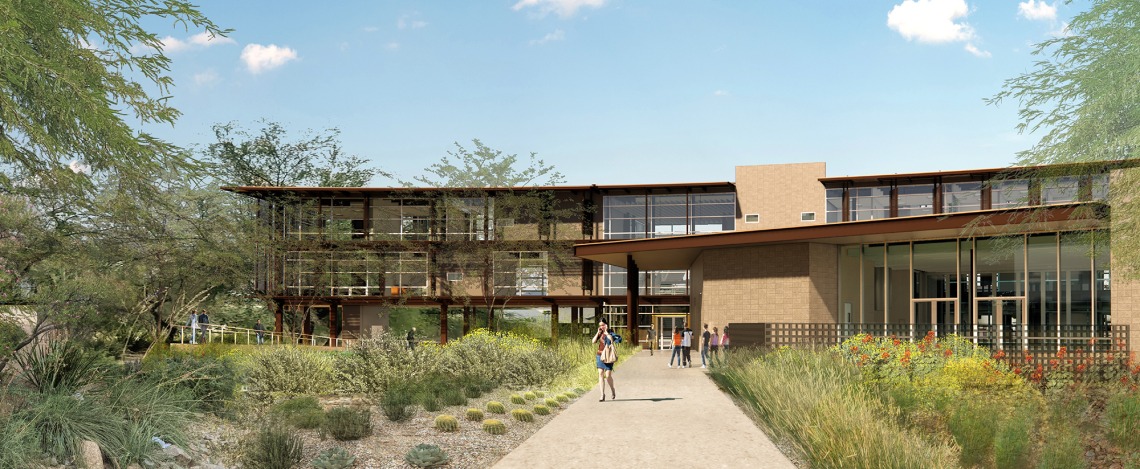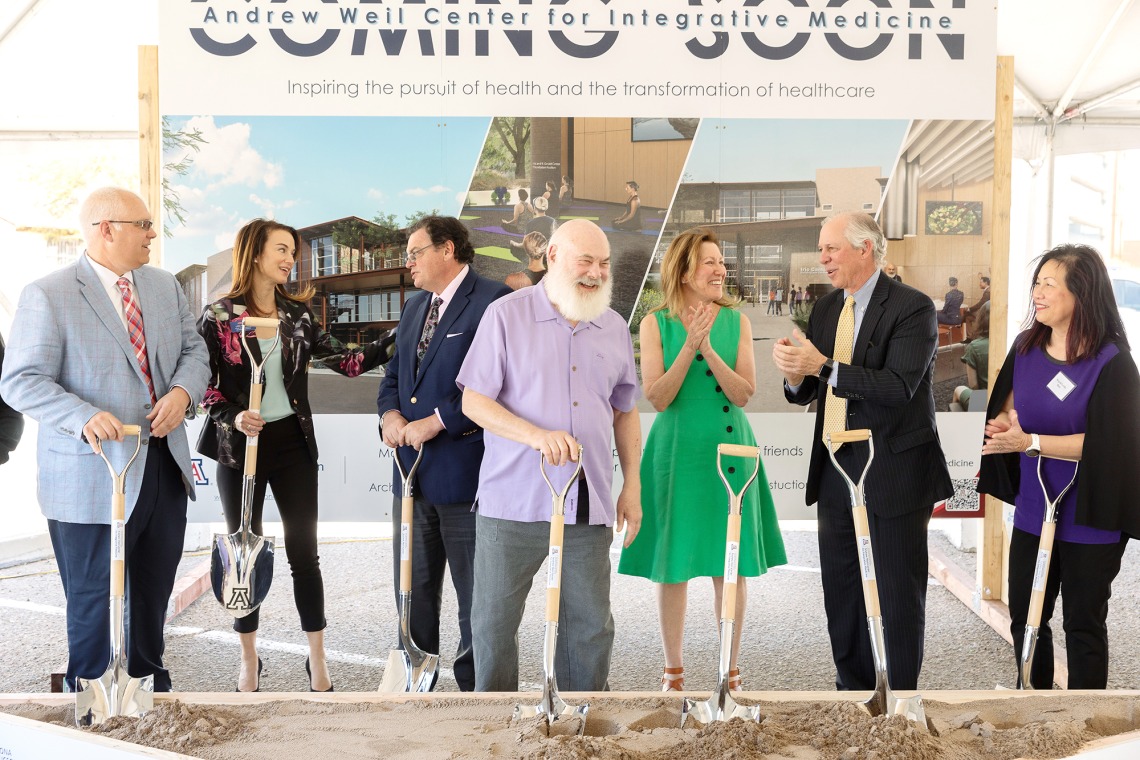Doors and Windows for Weil
A Worldly physician AND advocate for healing properties of mushrooms sees campus dream come to life.

The Center for Integrative Medicine will be encircled by desert flora.
/ Renderings by Line and Space, LLC
The hit 2019 movie “Fantastic Fungi” taught the world about nature’s gifts of fungi, yeast, molds and even mildew. Early in the film, out of the psychedelic swirls of bright colors and kaleidoscopic images, Andrew Weil emerges on the screen.
A renowned physician and researcher at the University of Arizona, Weil has been studying the benefits of mushrooms for years. “I recommend mushrooms and mushroom products to my patients, and I teach other doctors about their uses,” he says in the film.
“Mushrooms have molecules not found elsewhere in nature. Some have totally unusual properties.”
Many mushroom types, he explained recently in his office, have properties that increase resistance to infection and cancer. Scientists are researching the mushroom psilocybin, for example, for its nerve growth properties. And lion’s mane, a mushroom that gets star treatment in the movie, is being studied as part of the fight against Alzheimer’s disease.
Weil’s interest in the healing powers of plants and nature started early. When he was just 17, he began to travel around the world. Born in Philadelphia in 1942, young Andrew won a year-long scholarship to study in India, Thailand and Greece, where he learned about different medical practices. He was struck with wanderlust from then on.
When he returned to the U.S. from that first big trip, he went to Harvard University to study biology and ethnobotany. He stayed on at Harvard Medical School to earn his M.D. Eventually he went back to traveling the world, studying the power of psychoactive plants, including time with a Dakota medicine man and an Indigenous herbalist in Arizona.

Andrew Weil and Victoria Maizes, alongside UArizona President Robert C. Robbins, celebrate at the on-campus groundbreaking for the new center.
/ Chris Richards photo
He arrived at the University of Arizona in 1994 to create the Center for Integrative Medicine, which he describes as “an intelligent combination of conventional medicines with natural remedies.” Drawing on medical knowledge from practitioners around the world, his approach “selects treatments from other systems, with a strong emphasis on lifestyle and prevention.”
Weil was famous by then, through his books and public appearances, but his ideas were still considered provocative and controversial by more mainstream doctors. When he arrived at UArizona, he says, “there was a lot of opposition in the early years — though I think mostly we were ignored.”
Weil wanted to have a residency in integrative medicine and asked approval from then-dean James E. Dalen. Dalen, he says, told him, “Back up a step and think about creating a fellowship that people could take after completing the residency.”
“He was the first medical school dean to go out on a limb,” Weil fondly remembers. “He took a lot of flack for it.”
Over the years, integrative medicine has found its place at the university.
“It’s been great to watch the acceptance of it,” he says. “And now it’s in a rapid growth phase.” About 2,000 physicians have completed the Fellowship in Integrative Medicine. An additional 1,700 have completed Integrative Medicine in Residency at programs across the country including UArizona residencies.
The mushroom, of course, is part of the curriculum.
“Our center teaches about mushrooms to all the people that come through our program. It’s a major component of the curriculum. … There’s a huge body of research out there now, which wasn’t there when I first started.”
Since its founding, the Andrew Weil Center for Integrative Medicine has been located off campus. But on March 16, the university broke ground for a new site located within the UArizona Health Sciences Campus north of Speedway Boulevard on Cherry Avenue.
“Dr. Weil and the University of Arizona made medical history back in 1994,” UArizona President Robert C. Robbins proclaimed at the groundbreaking. “Now the Andrew Weil Center for Integrative Medicine will have a home worthy of the center’s reputation for excellence.”
The new center will have three buildings, each dedicated to an element of integrative medicine: mind, body and spirit. They will be surrounded by desert plants — like the ones that have inspired Weil since he was a teenager.
